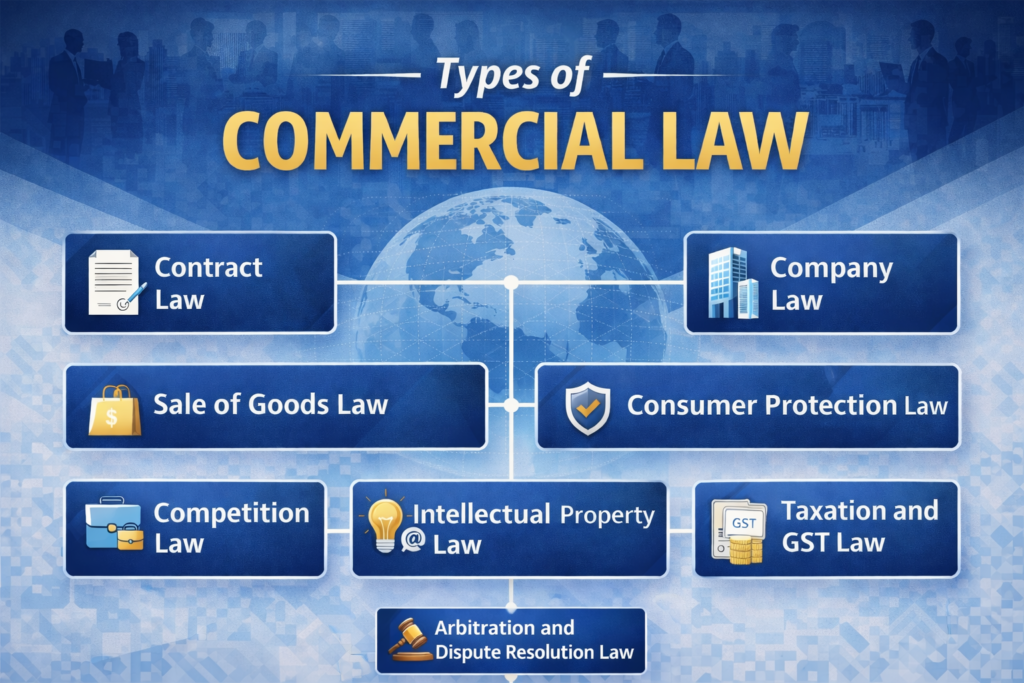Introduction
Commercial activities form the backbone of every growing economy. In India, businesses operate in a dynamic and highly regulated environment. Therefore, to ensure fairness, transparency, and accountability, the legal system lays down a strong framework known as commercial law. Understanding what is commercial law, its scope, and its application is essential for entrepreneurs, corporations, and even consumers.
In this detailed guide, we will explain what is commercial law, explore the types of commercial law, and analyze the structure and importance of commercial law in India. Moreover, we will support the discussion with facts, data, and real-world relevance to help readers grasp the subject with ease.
What Is Commercial Law?
To begin with, what is commercial law? Commercial law refers to the body of laws that regulate business and commercial transactions. It governs how businesses are formed, how contracts are executed, how goods and services are exchanged, and how disputes are resolved.
In simple terms, commercial law sets the rules that businesses must follow while dealing with customers, suppliers, competitors, and the government. It covers both domestic and international trade. As a result, it ensures trust and stability in the marketplace.
Furthermore, what is commercial law also includes laws related to banking, insurance, intellectual property, taxation, and corporate governance. Without these regulations, businesses would operate in uncertainty, leading to disputes and unfair practices.
According to industry estimates, India has over 63 million MSMEs, all of which rely heavily on commercial laws for contracts, payments, taxation, and dispute resolution. Therefore, understanding commercial law in India is no longer optional. It is a necessity.
Importance of Commercial Law in India
The importance of commercial law in India has grown significantly with the expansion of businesses, startups, and global trade. As India moves toward becoming a multi-trillion-dollar economy, commercial law acts as the legal backbone that supports smooth, fair, and transparent business operations.
To begin with, understanding what is commercial law helps businesses operate within a clear legal framework. Commercial law defines the rights, duties, and liabilities of businesses, thereby reducing uncertainty and legal risks. As a result, companies can focus on growth rather than disputes.
Moreover, one of the key reasons why commercial law in India is important is that it ensures fair trade practices. Laws related to contracts, competition, and consumer protection prevent fraud, monopolies, and unethical conduct. Consequently, this builds trust among consumers, investors, and stakeholders.
Key Reasons Highlighting the Importance:
- Legal Certainty:
Commercial law provides predictable rules for contracts, sales, and corporate governance. - Business Protection:
It safeguards businesses against breach of contract, unfair competition, and intellectual property infringement. - Consumer Confidence:
Consumer protection laws ensure transparency, product safety, and grievance redressal. - Investment Growth:
Strong commercial laws attract domestic and foreign investment by ensuring the enforceability of rights. - Efficient Dispute Resolution:
Arbitration and conciliation laws enable faster and cost-effective settlement of commercial disputes.
In addition, the various types of commercial law, such as company law, contract law, taxation law, and competition law, work together to maintain economic balance. According to government data, effective enforcement of commercial law has contributed to India’s improved ranking in ease of doing business.
Types of Commercial Law

Now that we understand what is commercial law, let us explore the major types of commercial law. Each type focuses on a specific area of business regulation. Together, they form the foundation of commercial law in India.
Contract Law
Among all types, contract law is the cornerstone of commercial transactions. In India, the Indian Contract Act, 1872, governs contracts.
A contract becomes legally valid when it includes:
- An offer
- Acceptance
- Lawful consideration
- Free consent
- Competent parties
In business, contracts define responsibilities, pricing, timelines, and penalties. Therefore, they reduce ambiguity and prevent disputes.
For example, contracts regulate:
- Supplier agreements
- Employment contracts
- Partnership deeds
- Service agreements
As per legal data, nearly 70% of commercial disputes in India arise from contract breaches, which highlights the importance of strong contract compliance.
Sale of Goods Law
Another important category under the types of commercial law is the law governing the sale of goods. The Sale of Goods Act, 1930, regulates transactions involving movable property.
This law defines:
- Conditions and warranties
- Transfer of ownership
- Rights of unpaid sellers
- Remedies for breach
For instance, if a seller delivers defective goods, the buyer has the legal right to claim damages or reject the goods. Thus, this law ensures fairness between buyers and sellers and supports ethical trade practices.
Company Law
Company law plays a critical role in shaping commercial law in India. The Companies Act, 2013, regulates how companies are incorporated, managed, and dissolved.
It governs:
- Private companies
- Public companies
- One Person Companies (OPCs)
- Corporate governance standards
Moreover, the Act mandates strict compliance with financial disclosures, audits, and board responsibilities. According to the Ministry of Corporate Affairs, over 1.6 million companies are currently registered in India, all governed by this law.
As a result, company law promotes transparency, investor protection, and accountability.
Consumer Protection Law
Consumer trust is essential for sustainable business growth. Therefore, consumer protection laws form a key part of commercial law in India.
The Consumer Protection Act, 2019, safeguards consumer rights such as:
- Right to safety
- Right to information
- And, the Right to redressal
Additionally, the Act introduced product liability and e-commerce regulations. With India’s e-commerce market expected to reach $200 billion by 2026, this law has become more relevant than ever.
Competition Law
Competition law ensures that markets remain fair and competitive. The Competition Act, 2002, prevents monopolistic practices and abuse of dominance.
It prohibits:
- Price-fixing
- Cartels
- Bid-rigging
- Unfair trade practices
The Competition Commission of India (CCI) enforces this law. In recent years, the CCI has imposed penalties worth ₹13,000+ crore on companies violating competition norms. This proves how actively commercial law in India is enforced.
Intellectual Property Law
In the modern knowledge economy, intellectual property (IP) is a valuable business asset. Therefore, IP laws form a crucial part of the types of commercial law.
India protects intellectual property through:
- The Patent Act, 1970
- The Copyright Act, 1957
- The Trademark Act, 1999
- The Designs Act, 2000
These laws protect inventions, brands, creative works, and industrial designs. As a result, businesses gain exclusive rights, encouraging innovation and investment.
Arbitration and Dispute Resolution Law
Litigation is often time-consuming and expensive. Hence, arbitration has become a preferred method of resolving commercial disputes.
The Arbitration and Conciliation Act, 1996, allows businesses to resolve disputes privately, efficiently, and confidentially. According to industry reports, arbitration reduces dispute resolution time by 40–60% compared to traditional litigation.
This makes arbitration an essential pillar of commercial law in India.
Taxation and GST Law
Taxation directly affects business profitability. The Goods and Services Tax (GST) Act, 2017, transformed India’s indirect tax system.
GST unified multiple taxes into a single framework, improving compliance and transparency. Today, over 14 million businesses are registered under GST, making it one of the largest tax systems globally.
Thus, tax law remains one of the most impactful types of commercial law.
Consequences of Non-Compliance with Commercial Law
Non-compliance with commercial law in India can expose businesses to severe legal, financial, and reputational risks. When companies fail to understand what is commercial law and ignore applicable regulations, the consequences often extend beyond monetary losses.
To begin with, businesses may face heavy financial penalties imposed by regulatory authorities for violating contract, taxation, competition, or consumer protection laws. In serious cases, non-compliance can also result in criminal liability, including prosecution of directors and key managerial personnel.
Moreover, regulatory bodies may suspend or cancel business registrations, licenses, or permits, directly disrupting operations. As a result, companies may be forced to halt activities or exit the market entirely.
Equally important, reputational damage can significantly impact brand value and customer trust. Once credibility is lost, rebuilding market confidence becomes extremely difficult. Additionally, investors and financial institutions often withdraw support from non-compliant businesses, leading to a loss of investor trust and funding opportunities.
Therefore, adherence to the types of commercial law is not merely a legal obligation but a strategic advantage that ensures stability, growth, and long-term business sustainability.
Landmark Case Laws Under Commercial Law
Landmark judicial decisions play a crucial role in shaping and interpreting commercial law in India. While statutes define the legal framework, case laws clarify what is commercial law in real business scenarios and ensure consistent application of legal principles.
One of the most significant cases is Mohori Bibee v. Dharmodas Ghose (1903), where the court held that agreements entered into by minors are void. This ruling strengthened contractual certainty under commercial law. Similarly, State of Madras v. Gannon Dunkerley & Co. (1958) clarified the distinction between a contract of sale and a works contract, which has a direct influence on taxation and trade practices.
In the corporate law domain, Tata Consultancy Services v. Cyrus Investments Pvt. Ltd. (2021) reaffirmed corporate governance norms and the powers of company boards. Another notable case, Novartis AG v. Union of India (2013), had a major impact on intellectual property rights by preventing patent evergreening.
These landmark judgments have significantly contributed to the evolution of the types of commercial law, ensuring fairness, transparency, and business confidence in India’s commercial ecosystem.
Recent Amendments in Commercial Law in India
In recent years, commercial law in India has undergone substantial reforms to support ease of doing business and economic growth. These amendments reflect the government’s effort to modernize laws and align them with global standards.
The Competition (Amendment) Act, 2023, introduced faster merger approvals, settlement mechanisms, and penalties linked to global turnover. Similarly, amendments to the Companies Act have decriminalized minor offenses, reduced compliance burdens for startups, and promoted digital governance.
The Consumer Protection (E-commerce) Rules strengthened consumer rights in online marketplaces, while multiple amendments to the Arbitration and Conciliation Act reduced court intervention and encouraged institutional arbitration.
Together, these reforms redefine what is commercial law in the modern era. By updating the types of commercial law, India continues to create a transparent, business-friendly, and investor-focused legal environment.
What’s the Difference Between Commercial Law and Corporate Law?
Although commercial law and corporate law are often used interchangeably, they are not the same. To clearly understand what is commercial law, it is important to distinguish it from corporate law, especially within the framework of commercial law in India. While both areas regulate business activities, they differ in scope, purpose, and application.
To begin with, commercial law is a broad legal field that governs day-to-day business transactions. It focuses on how businesses interact with customers, suppliers, competitors, and regulators. For example, commercial law covers contracts, sale of goods, consumer protection, competition law, intellectual property, taxation, and dispute resolution. In other words, it defines the rules of trade and commerce. Therefore, when discussing the types of commercial law, corporate law is often considered a subset within this larger framework.
On the other hand, corporate law deals specifically with the internal structure and management of companies. It regulates company formation, shareholder rights, board responsibilities, mergers, acquisitions, and corporate governance. As a result, corporate law primarily focuses on how a company operates internally rather than how it conducts external trade.
Moreover, while commercial law in India applies to all forms of businesses, including sole proprietorships and partnerships, corporate law applies only to registered companies. Consequently, a small trader may be governed by commercial law but may never fall under corporate law.
What is commercial law can be understood as the umbrella governing all business activities, whereas corporate law functions as a specialized branch within it. Therefore, while both are interconnected, they serve distinct legal purposes in regulating business operations efficiently.
Conclusion
To sum up, understanding what is commercial law is vital for anyone involved in business. The various types of commercial law work together to regulate contracts, companies, consumers, competition, and innovation. Most importantly, commercial law in India provides a stable and transparent framework that supports economic growth.
As India continues to expand as a global business hub, staying updated with commercial laws will help businesses operate smoothly, avoid disputes, and achieve long-term success.
References:
- Ministry of Corporate Affairs (MCA), Government of India
- Legislative Department, Ministry of Law & Justice
- Competition Commission of India (CCI)
- Central Consumer Protection Authority (CCPA)
- Goods and Services Tax (GST) Portal
FAQs on Commercial Law
- 1. What is commercial law?
Commercial law refers to the set of legal rules that regulate business activities, trade transactions, contracts, and commercial relationships between parties.
- 2. What are the main types of commercial law?
The major types of commercial law include contract law, company law, sale of goods law, consumer protection law, competition law, intellectual property law, taxation law, and arbitration law.
- 3. Why is commercial law important for businesses in India?
Commercial law in India ensures fair trade practices, protects business and consumer rights, and provides legal certainty for contracts and transactions.
- 4. How does commercial law differ from corporate law?
While corporate law governs company formation and management, commercial law broadly covers all business transactions and trade-related legal matters.
- 5. What happens if a business does not comply with commercial law?
Non-compliance with commercial law in India can lead to penalties, legal action, license cancellation, reputational damage, and loss of investor confidence.




Pingback: Political Influence on Law Firms: Safeguarding Legal Practices
Pingback: How to Choose the Best Business Entity in India in 2025?
Pingback: Intellectual Property Rights (IPR) & Arbitration: Complete Guide
Pingback: How to Choose the Right Business Structure for Success